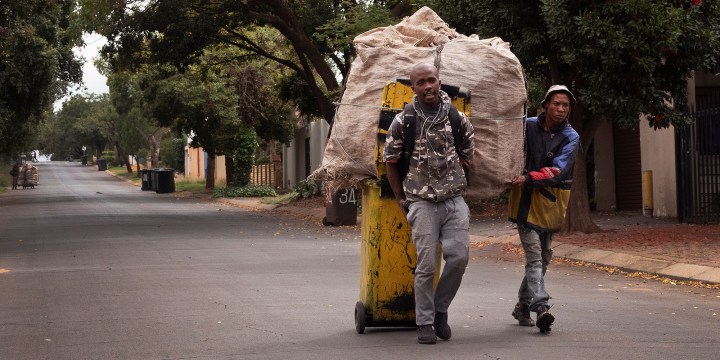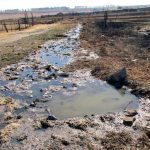OUR BURNING PLANET
The big cull: Whose lives matter in the race to slow climate collapse?

The human tribe has swelled to 7.8 billion, and we’re now slamming up against the hard natural boundaries of an over-extracted planet. Blaming ecological overshoot on population size alone is a red herring, though. It lets the real culprits driving climate collapse off the hook and is fodder for white supremacists’ hatred of the ‘other’.
When Buyiswa (not her real name) and I were born in 1972, the global population was 3.8 billion, and the concentration of carbon pollution in the atmosphere was 327 parts per million (ppm). Nearly 50 years later, the population has doubled, and pollution levels are up to 415 ppm. Over half of the carbon pollution that’s been dumped into the atmospheric waste-fill since the start of the Industrial Revolution was put there in the time that Buyiswa and I have been alive.
Neither of these can continue to follow their current growth curves.
Here’s a little cameo, though, which shows better than any actuarial number-crunching just how much of a red herring it is to argue that population growth alone is driving climate collapse.
When Buyiswa and I met at her home in Khayelitsha, an informal settlement outside Cape Town, we discovered that our lives could have been a social twinning experiment.
We’re the same age. We both went to school in the border dorp of Queenstown, in the Eastern Cape, and moved to iKapa to further our prospects. We’ve both spent most of our working lives investing in property to secure ourselves financially. Hers is a three-bedroom home, built room by room with zinc sheets and boards paid for over the years with money squirrelled away as a domestic worker, a job she started as a teenager when I was still in Grade 9. Mine is a two-bedroom Art Deco apartment in the suburbs, with a title deed, insurance, and the bond that’s nearly paid off. We’re both self-employed, with unusual agency over our lives in a world that still keeps women at heel. If memory serves (my field notes are deep in my archives), she has four children. I have none, by choice.
The difference between us, though, is that through the random accident of chance, Buyiswa was born into a black, Xhosa-speaking family in a time when the state, through laws written by the minority to favour the minority, blocked her chances of getting a fair education, decent healthcare, or the ladder-climbing potential of social connections and wealth accumulation.
I was born onto a superhighway that took me directly into the consumer class. Buyiswa’s was a road broken with potholes of adversity. No matter how skilled she was as a driver, the chances of her cruising into a secure and comfortable middle-class life were always stacked against her.
If the script had been flipped — if I’d been born into her family, and she into mine — our stories would read quite differently. I would likely have left school at 13, as she was forced to. I’d be battling to run a small takeaway business from my shack, with a dodgy electricity connection, a jerry-rigged water system, and the nearest toilet a foul communal setup about 50m from the front door. I’d be bailing water out of my flooded kitchen during a winter storm. I’d lose income for each hour spent queueing at the clinic for my chronic medication. I’d be fretting about how to feed my children during the lockdown.
This Cape Town cameo isn’t unique, in one of the most unequal countries in the world. This is typical of the story of the gulf between the haves and the have-nots in today’s global village. It’s the denouement of centuries of imperial conquest, colonial extraction, and more recent neoliberal economics which have fortified the privileges of the elite and abandoned the rest to their plight.
The rich are feasting
Oxfam has done the number-crunching to explain why a family like Buyiswa’s can’t be held responsible for all the carbon waste emitted in the time that she and I have been alive.
In the Extreme Carbon Inequality report, Oxfam calculates that the poorest half of the global population — around 3.5 billion people — are responsible for about 10% of total global emissions from individual consumption. Half of all individual emissions come from the richest 10% of the world’s population. These rich people “have average carbon footprints 11 times as high as the poorest half of the population, and 60 times as high as the poorest 10%”.
Activist and writer George Monbiot sums it up in The Guardian recently: “… while the global population is rising by 1% a year, consumption, until the (coronavirus) pandemic, was rising at a steady 3%. High consumption is concentrated in countries where population growth is low. Where population growth is highest, consumption tends to be extremely low.”
Yet the argument for slowing population growth as a quick-fix to the climate crisis still gets trotted out — even documentary filmmaker Michael Moore fell into this trap in his recent film Planet of the Humans. While it’s true that the size of our population is responsible for many pressures on the natural world, and the planet can’t sustain these growing numbers indefinitely, population itself is not the foot-on-pedal of carbon pollution.
Co Opting green issues to justify ‘culling’ of the poor majority
Brenton Tarrant, the 28-year-old who murdered 51 people during a shooting spree at two mosques in New Zealand last year, described himself as an ethno-nationalist and eco-fascist. Patrick Crusius, who murdered 23 people — mostly Latino — in El Paso, Texas, last August, shared similar views about the link between overpopulation and environmental collapse.
This “greening of hate”, writes Joel Achenbach in The Washington Post, is how white supremacists “have latched onto environmental themes, drawing connections between the protection of nature and racial exclusion”.
This hatred of a fecund and often dark-skinned “other” goes way back, though.
Thomas Malthus was the 18th-century scholar who bastardised Darwin’s ideas of biological evolution to justify social and political hierarchies in Britain at the time. The elites, he argued, had somehow earned their privilege and rank in what he saw as the social expression of Darwin’s “survival of the fittest” (Darwin actually talked about survival of the most well-adapted, but that’s another story).
In the view of social ecologist Murray Bookchin, writing in The Population Myth, this allowed the establishment to justify “the wanton plundering of the world by the wealthy or the ‘fittest’, while the labouring classes, dispossessed farmers, and Third World’“savages’ were reduced to penury, presumably because they were’“unfit’ to survive… (it) testified to a harsh class system that invoked’“natural law’ to justify the opulence enjoyed by the ruling few and the hunger suffered by the ruled many”.
Malthusians could now give a shoulder-shrug to the suffering of the poor masses whose population they thought needed to be controlled either “naturally or artificially” through big-cull events, such as plague, war, or famine. Add a dash of neoliberalism to this – where people and nature are reduced to units of commodifiable labour or resources for extraction and the poor or unskilled become society’s least productive – are superfluous to the system, and expendable. As New York City subway driver Sujatha Gidla wrote in the New York Times recently, after contracting Covid-19, workers like her aren’t essential, they’re sacrificial.
Malthus’s intellectual sparring partner was journalist and philosopher William Godwin, who got to the nub of things generations before Michael Moore’s ham-fisted attempt at interrogating the issue: the problem isn’t population size, it’s the concentration of power. How prescient Godwin’s words were. The same power structures he wrote of then still have their heel on the necks of the world’s poor today.
The half-century in which Buyiswa and I have been alive have been the glory days of neoliberal economics. In this time, governments have agreed to a system that has allowed the new elites — powerful multinational corporations and the men who run them — to tighten their hold, hoard more wealth, co-opt lawmakers to keep re-writing the rules in their favour, and pollute the atmosphere at no cost to themselves. Blaming families like Buyiswa’s for climate collapse is the perfect magician’s trick to distract the voting public from the real corruption that lies behind an economic system that is destabilising the common-good natural systems on which life depends. DM




















